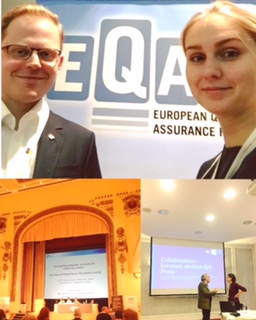In November, SFS participated with two representatives at the annual European quality assurance conference EQAF 2016 in Ljubljana, Slovenia. This year, we, Charlotta Tjärdahl and Fredrik Hylerstedt, had the great opportunity to go and represent, network and learn at the conference. EQAF stands for European Quality Assurance Forum, and the interest was naturally great from the Swedish side with many participants from authorities, universities, politics and student organizations. Speaking of students, it was fantastic fun that during the conference not only a large number of students were present, but also that the conference for the first time had a national student organization, Slovenian SSU, as host.
The role of students in the quality development of higher education cannot be limited to student influence and education monitoring. Ensuring what at European level is usually called “student engagement”, ie student participation in Swedish terms, is becoming increasingly important in the work of developing the quality of higher education. This is clearly written in European Standards and Guidelines (ESG), a document on which the new Swedish quality assurance system is based. Student-centered learning and the students' role in quality development of higher education can thus be expected to take an increasing part in the work also at home. We are happy about that!
The role of students in the development of learning, on the other hand, was not all that was discussed, but another clear example of systems and measures for developing quality was investments in the development of higher education pedagogy and an understanding of learning theory. The issue was discussed with different understandings of the underlying theory, and despite some good examples, we can state that much remains to be done at the international level as well.
Implementation of quality systems that are done within a context was a main theme for the conference and is also something very relevant at home nationally and locally with the new quality assurance system. In a context-based system, for the sake of simplicity, it can be described as the system allowing for differences depending on who and where the system examines. In Sweden, there is an approach to do just that by allowing higher education institutions to evaluate their own quality development / quality assurance work in higher education reviews and then assess this in relation to actual examples of how it works in practice. Can you assess a system and see if it follows certain principles and still allow for differences? We believe the key lies in understanding the system and training the assessors.
For us as students, this means that we need to work on competence building around the new system, both in relation to unions, but also for the student representatives who will participate in the assessment groups. At EQAF, we received great inspiration and answers to difficult questions regarding the use and development of the concept with so-called assessor pools. This is an issue we have been thinking about for a long time and hope to be able to develop at home as well. In this way, we can not only in a strong way fulfill our role in the new system, but also build up an interest and competence for quality issues. These are exciting days ahead of us!
Finally, something special we take with us from the conference is that it was extremely interesting to see how, despite the harmonization of higher education in Europe, to some extent through the Bolonga process and other things, we have not come as far in harmonizing the quality assurance of it. . The ESG document and the EQAF conference are steps in the right direction, but there is still a long way to go before we can say that there is a European quality assurance system.
Charlotta Tjärdahl, Vice President of the Swedish National Union of Students
Fredrik Hylerstedt, Swedish National Union of Students' expert group for higher education evaluation
